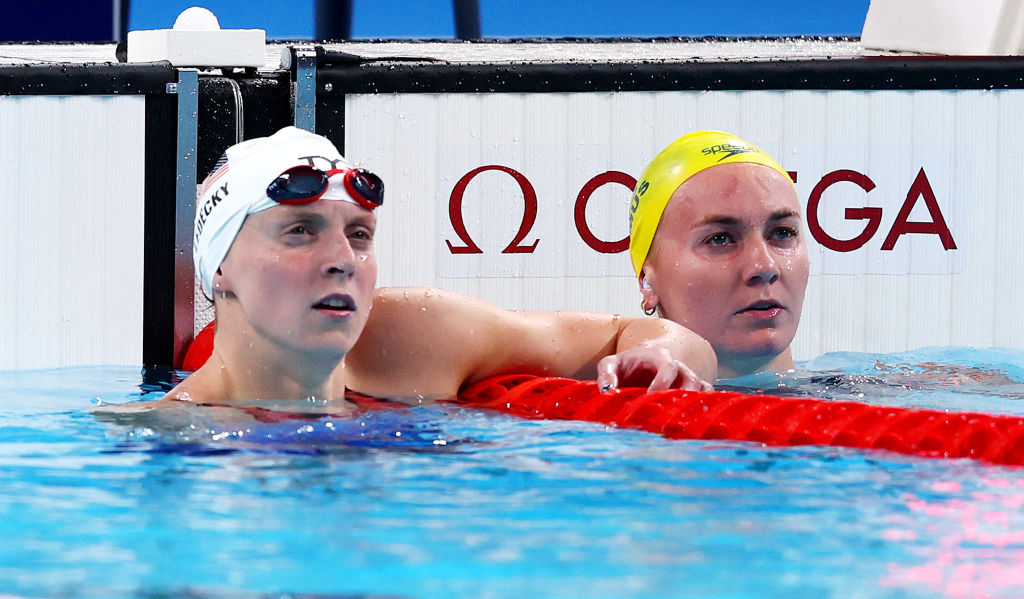“Stop being sore losers.”
“The U.S. have this infernal cow bell they ring. As someone leaves to go to the competition pool, they ring out, ‘USA, USA.’ I have never wanted to punch someone more and steal the cowbell. I really hope someone did.”
[time-brightcove not-tgx=”true”]
Those are the fighting words that reignited a rivalry in the pool that goes back decades. Australian swimmer Cate Campbell lashed out at the Team USA swim team last year following the 2023 world swimming championships, at which the U.S. claimed the most medals but Australia earned the most golds. “Australia coming out on top of the world is one thing, but it is just so much sweeter beating America,” the four-time Olympian said during an interview on the Today Show in Australia.
It was the first time that Australia claimed more golds than the U.S. in more than two decades, and earned the most medals in its history at a major international meet, so the crowing was understandable—but perhaps not excusable.
Campbell’s comments set the stage for a renewed interest in the battle between the two great swimming nations, which have jostled for the top of the medal counts at every recent World Championships and Olympics.
“I think you have to go back to 1956; that was the last time that Australia was No. 1 in the world in swimming,” says Rowdy Gaines, NBC commentator and former Olympic gold medalist. That’s according to World Aquatics, which ranks countries in swimming by a points system that accounts for results in final and semi final races, he says.
But the battle over most medals at world events vs. most golds is what keeps the tension between the U.S. and Australia alive, and probably intensified in the years before the 2000 Sydney Olympic Games. Summer Sanders, who won gold in the 200-m butterfly at the 1992 Olympics, recalls that her biggest rival was Australian Susan O’Neill from Australia, who earned silver. “Any time an Australian was in a race the team would chant ‘Aussie, Aussie, Aussie, Oi, Oi, Oi’ and it was like fingernails on a chalkboard,” she says. “Any time I heard that it would fire me up; I would get so annoyed by it.”
At the 2000 Games, in front of an Australian crowd, U.S. sprinter Gary Hall famously predicted that the U.S. men’s 4×100-m freestyle relay team would “smash [the Australians] like guitars.” The U.S., after all, had won the event seven times before those games. When the Australians came out on top to break the American streak, Australian Michael Klim notoriously played an air guitar on deck to tease the U.S. team.
Nathan Adrian, three-time Olympian and eight-time Olympic medalist, remembers first being introduced to the rivalry as a junior national swimmer in 2015. “These guys had a really cool awesome accent and they were like, ‘Hey mate, we’re going to crush you in that relay,’” Adrian says.
To his recollection, it was in 2016 that the Americans broke out the cowbell. “I don’t think it was intended to be annoying but it was literally the thing that we did; maybe it was a Pavlovian response but when you heard the cowbell it meant someone from Team USA was going up, so give them your energy. And it worked. The fact that it got under everybody else’s skin—that’s a side effect.”
The one-upmanship intensifies during relay races, especially in the freestyle matches, in which Australia often has a slight advantage.
“It’s good fun in the end,” says Lilly King, who is competing in her third Olympics in Paris as the world record holder in the 100-m breaststroke. “I love trash talk, I think it’s fun, I think it’s healthy. It’s kind of light hearted but there is also a little bit of mean behind it, which is something I definitely enjoy.” King points out that Campbell didn’t compete at the World Championships this year and “didn’t remotely contribute to this so keep your mouth shut—that’s where I’m coming at on this,” she says. Since she made her comments, Campbell failed to make the Australian team for Paris.
Kaylee McKeown, a backstroker who will be swimming Paris, acknowledges the friendly rivalry between the countries but took a dig at Campbell for the harshness of her comments. “I think there’s a right and wrong way to say things. Cate’s entitled to her opinion but I just want the U.S. to know that she’s not speaking on behalf of the whole Australian team. I don’t like being called sore losers on our behalf so I couldn’t imagine how [the Americans] would feel,” she said to the Daily Telegraph in a virtual interview.
Campbell has since attributed her comments to a misunderstanding, and said that they were “not meant to be disrespectful. I need to understand that not everyone understands the Australian sort of larrikin sense of humor,” she said to the Sydney Morning Herald.
For athletes like King, the trash talk and ribbing only help to push her further in the pool. “I’ve never said something to someone’s face. And we do get along. But we are competitors in the end, and we want to win the most medals.” Within hours of Campbell’s comments circulating on the internet last year, King responded on social media “Sorry we aren’t so uptight we can’t cheer for our teammates as they walk out for events. See you in Paris.”
King made good on that promise, while Campbell couldn’t. Let the Games begin—and the rivalry continue.

